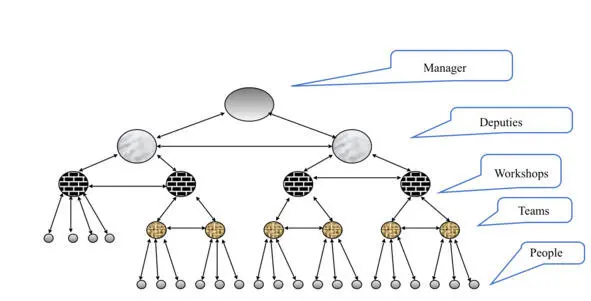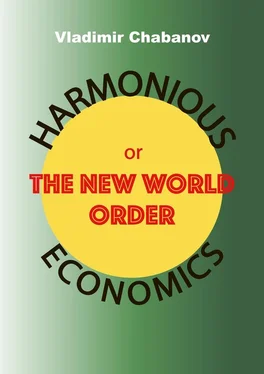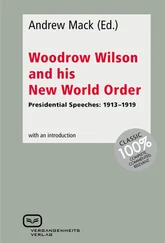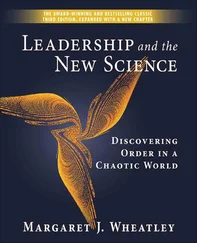Labour cooperation converts labour quantity into higher quality thanks to “ the creation of a new power, namely, the collective power of masses ’ (K. Marx [40]). Cooperation is followed by joining of the results of differentiated labour; as the result, labour productivity increases faster than aggregate labour consumption. It is this correlation that allows resolving global issues: developing science, education, culture, building defence from enemies, constructing canals, dams, roads, and other structures that serve a public purpose, and bring collective benefit.
Rational combination of labour differentiation and cooperation shapes all economic structures. For instance, workers unite to make a team, teams form workshops, which are parts of companies, enterprises, plants, and economic sectors.
On the other hand, the state is a cooperation of its regions, a region is a cooperation of districts, areas, etc. Thus, labour differentiation and cooperation can apply both within production framework, and depending on the territory; they function both in space and time.
In literature on economics this structure is called “organisation hierarchical tree’.Figure 2 shows such tree for a random plant. However, this structure is applicable to other types of organisations as well, including the state. In each case it is determined by a series if objective and subjective factors, by the production and organisation type, its level of development, management, production and human relations, type of property, etc.
At the same time, as it is easy to see, each link, each cell of production has both labour differentiation and labour cooperation. For instance, if we analyse the organisation tree from Figure 2, from top to bottom, we will notice the division of all structures into a number of cells. But when you move from bottom to top, then all the cells combine in cooperation to create a bigger structure. Thus, labour differentiation and labour cooperation are interdependent instruments of organisation. Labour differentiation pattern determines the reasonable level of labour cooperation. And vice versa, cooperation allows to deepen labour differentiation processes. When a worker does not have to do everything in life himself, he can specialize in his profession even more. At the same time, he would be more interested in cooperating with other workers and units.

Fig. 2. Modern enterprise “organisation tree’
This is why labour differentiation contributes to a more intense labour cooperation within professional or territorial unions. Moreover, without cooperation with other structures labour differentiation is not efficient and cannot be allowed. A metallurgist will only work well when a farmer provides him with food to eat. The same level of interdependence is observable with all other professions.
On the other hand, the impact of the above-mentioned factors on people is not uniform. Labour differentiation makes workers more egoistic, and limits their circle of interests to personal problems. Cooperation, on the contrary, makes people part of a bigger entity, more important than a single person. This elevates the man, enlarges his scope of interests including other people in it, helps understand his place in the hierarchy of the community, the society, and the entire Universe. Thus, the man becomes wiser and more far-seeing. The combination of the factors mentioned generates the variety of human characters, promotes a dialectic unity of the humanity, and integrates people within each other, within their communities and the World.
This means that no labour differentiation is possible without cooperation, just as no cooperation is feasible unless the components of the whole are divided. Every unit is created through labour differentiation of a bigger entity, and all divided labour is reunited in a bigger structure. And this does not depend on property form, on fashion, on organisation name, or nature of its activities.
Every enterprise, every organisation possesses dual qualities. On the one hand, its mission is to satisfy the needs of its employees, on the other hand, to satisfy social needs. “ Capitalists and workers are equally wrong in thinking that enterprises exist for the sake of income. They disagree on who should have this income. In reality, enterprises exist for satisfying social needs ’ 47 47 [ Translator’s note: Translated by me.]
(H. Ford [38]).
It is evident that without social functions any enterprise loses all sense to exist, as if the workers and the owners were not interested in the results of their own labour. Absence of social functions turns organisations into business mechanisms, that is, hospitals then work for the profit of doctors, schools – for teachers, banks – for their own gain, administrative services become ordinary tools for enrichment, and armies serve the well-being of generals.
On the other hand, labour differentiation and cooperation generate additional types of work, not required before, like coordination, supply, control, accounting, and management. It would be hard to classify them as anything better than social labour waste if they did not create conditions for labour differentiation and cooperation, and did not help save social labour to a greater extent than they consume it. However, this is not always the case. In certain conditions the amount of supplementary labour is inexcusably large and its efficiency (i.e. the capacity to save social labour) derisory.
The managing and controlling structures often expand disproportionately to the actual need in them and to the results of their own work. This happens very often. That is why the problem of balance between various types of divided labour, of organisation of their cooperation, and of coming up with methods to determine the nature and the way of labour remuneration is rather complex. It will be described in greater detail in 3.1.
Конец ознакомительного фрагмента.
Текст предоставлен ООО «ЛитРес».
Прочитайте эту книгу целиком, купив полную легальную версию на ЛитРес.
Безопасно оплатить книгу можно банковской картой Visa, MasterCard, Maestro, со счета мобильного телефона, с платежного терминала, в салоне МТС или Связной, через PayPal, WebMoney, Яндекс.Деньги, QIWI Кошелек, бонусными картами или другим удобным Вам способом.
[ Translator’s note: This English-language translation of the monograph is based on the Russian-language manuscript provided by the author; it may, therefore, contain a number of slight differences from the published Russian version of the book.]
[ Translator’s Note: Unless stated otherwise, all quotations from English-language original sources and English translations of foreign-language sources referenced in the bibliography are cited from the respective originals/ translations. All other quotations, unless stated otherwise, have been translated into English for the present edition. All biblical quotations are cited from the Authorized King James Version of the Bible.]
Читать дальше













